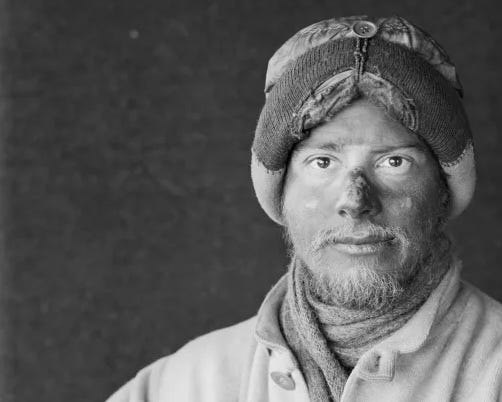Advice is in italics.
Sarcastic and deliberately bad advice is in bold italics.
“Journey”
If you are prepared to refer to what you do, as a writer, in the vague-speak of Reality TV (‘It’s been a real journey and I’ve learned so much about myself’) then you are making it difficult for yourself to be anything other than entirely rubbish.
Martin Amis made himself seem entirely pretentious by calling a book of his non-fiction writing The War Against Cliché. But Martin Amis was trying to be honest about the field in which writers, and thinkers, exist.
It is even more difficult to write without clichés of the soul than without clichés of expression.
Refuse to accept the common way of expressing anything.
Believe that human beings are more right about the world than they have ever been, and that human beings in the past were really stupid for not knowing all the stuff we know.
Further Reading: Apsley Cherry-Garrard, The Worst Journey in the World
Kafka
You see, my Ancestors refuse to leave me alone. Kafka has no practical place here but he owns the letter K.
Go away, Franz.
Accept that you are not self-generating. Go for a walk in a graveyard.
Sit in Starbucks, writing, surrounded by notes, in the awareness that you will appear interesting to your fellow caffeinated artists.
Further Reading: Anne Carson, If not, Winter: Fragments of Sappho, Virago
Legwork/Life-Threatening Situations
One of my blindspots is research, engagement, reportage. This would be, for me, a way of making difficult. Because I never willingly leave my writing room.
However, you may be a writer for whom writing is impossible without a basis of first-hand, physical knowledge. For something to become a subject for you, it may need to have damaged you.
Most writers, I would say, prefer engaging with fictional characters to engaging with real people (that’s one of the reasons why they became writers). But the more you engage with real people, the better your characters will be. (I am saying this to myself as much as you.) The reason there are few good novels about manual labour is that writers are averse to it.
Put yourself where it is hard to remain.
Try to encounter people only like yourself.
Further Reading: Werner Herzog, The Conquest of the Useless: Reflections from the Making of Fitzcarraldo, Ecco.
Medication
You may be on medication. You may need, for the rest of your life, to be on medication. You may also self-medicate. You may be an alcoholic or another kind of addict. This is one of the very best ways of making it difficult for yourself.
I am not going to say, ‘Give it up,’ — I am going to say, ‘Think carefully about your priorities.’
In other words, be canny about the kind of writing you are likely to be able to achieve. Surf your manic states; hunker down through your glooms.
Realise that, without the particular kind of non-writing you do, the writing you do would not be the same.
Carry on just as you were.
Further Reading To Avoid At All Costs: David Foster Wallace, ‘The Depressed Person’, Brief Interviews With Hideous Men.
Newness
This is the obverse of Ancestors. They make it difficult by representing all they did that you have not done; making-it-newness makes it difficult by representing all you have not done that you need to do. (See Obstacles.)
Make it new.
Develop an elaborate argument that we are entering a new classical age – similar to the Seventeenth Century – in which furious originality is no longer a virtue. It is better, say, to provide your audience with exactly what they want rather than to pursue an estranging individualism.
Further reading: Obstacles
Obstacles
A writer is only as original as their obstacles.
Examine closely what most contemporary writers think is not worth writing about. Write about that.
The only obstacles are the ones in the way of your career. As long as you can get a very large publishing deal, everything else will sort itself out.
Further Reading: Fernando Pessoa, The Book of Disquiet, Serpent’s Tail.



I've worked manual labour since school (apart from long periods of non-functional states, unemployed due to disability), and I notice most writers don't know it. Same for fight scenes. You can tell when a writer has known true violence in their lives, either received or delivered, or as is more often, both.
I'm glad the 'Refuse to accept the common way of expressing anything' weren't in bold.
See also ‘Conquistadors Of The Useless’, a classic mountaineering book by Lionel Terray.